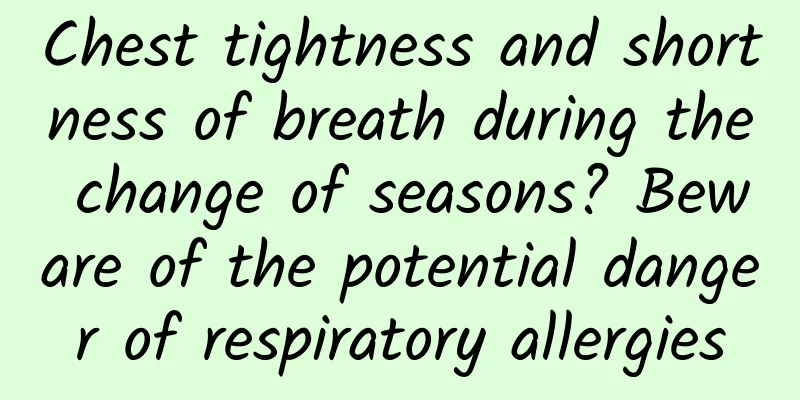Chest tightness and shortness of breath during the change of seasons? Beware of the potential danger of respiratory allergies

|
Science expert: Chen Binbin Unit: Dashijie Community Health Service Center Every spring and autumn, many people experience nasal congestion, runny nose, coughing, and even chest tightness and shortness of breath. Many people think that this is caused by a "cold" or "weather change", but they don't know that this may be an alarm from respiratory allergies! This allergic reaction, known as the "invisible enemy", is quietly threatening the health of about 1 billion people around the world. This article will take you to unveil the mystery of respiratory allergies from the aspects of allergy mechanisms, common causes, potential hazards and protective measures. 1. What is respiratory allergy? Respiratory allergies are an overreaction of the immune system to harmless substances (such as pollen and dust mites). When allergens enter the nasal cavity or lungs, the immune system will mistake them for "dangerous enemies" and release chemicals such as histamine, causing symptoms such as sneezing, runny nose, and difficulty breathing. According to statistics from the World Allergy Organization, 1 in 10 people in the world suffers from allergic rhinitis, and 30% of them may develop asthma. 2. Allergens: Invisible “Invisible Killers” 1. Pollen : Spring tree pollen (such as sycamore and poplar) and autumn weed pollen (such as wormwood) are the main causes. 2. Dust mites : The excrement of dust mites in mattresses and carpets is a common allergen. 3. Mold : Mold spores that grow in humid environments can easily cause allergies. 4. Pet dander : shed hair and salivary protein from pets such as cats and dogs. 5. Air pollution : car exhaust and industrial waste gas will aggravate allergic reactions. 3. The “chain bomb” of allergic reactions Allergies may seem like just a few sneezes, but they can actually cause a series of health crises: Asthma attack : Continuous coughing and wheezing may be a precursor to asthma, which can be life-threatening in severe cases. Sinusitis : Swelling of the nasal mucosa causes nasal congestion, headaches, and even loss of smell. · Otitis media : Eustachian tube obstruction causes ear congestion and hearing loss. Sleep disorders : Nighttime coughing and nasal congestion lead to insufficient sleep, affecting daytime work efficiency. · Psychological problems : Long-term discomfort may cause emotional disorders such as anxiety and depression. 4. Scientific protection: creating a breathing "safe zone" 1. Environmental control: stay away from allergens During pollen season, close doors and windows and use an air purifier (HEPA filter). Wash your bed sheets and quilt covers in hot water above 55°C every week to kill dust mites. Keep indoor humidity below 50% to prevent mold growth. People with pet allergies should avoid contact with animals and clean their homes regularly. 2. Daily management: enhancing immunity · Diet: Eat more citrus fruits and broccoli rich in vitamin C, and supplement with probiotics. · Exercise: Do moderate aerobic exercise (such as brisk walking, swimming) 3-5 times a week to improve lung function. · Work and rest: Ensure 7-8 hours of sleep to avoid excessive fatigue and reduce resistance. 3. Emergency treatment: correct medication use Antihistamines: to relieve sneezing and runny nose (such as loratadine). Nasal hormone: relieves inflammation of nasal mucosa (on doctor’s orders). Bronchodilators: used during acute asthma attacks. Immunotherapy: People with severe allergies may consider desensitization therapy. V. Precautions for special groups Children : Allergies may affect growth and development, causing problems such as adenoids hypertrophy and difficulty concentrating. Pregnant women : Use medication with caution and give priority to physical protection measures. Elderly people : Allergies may aggravate cardiopulmonary diseases and require increased monitoring. 6. Revealing the misunderstandings! Myth 1 : Allergies will go away on their own. Myth 2 : Allergy medicines are addictive. Myth 3 : Allergies only occur in spring. Conclusion Although respiratory allergies cannot be cured, they can be effectively controlled through scientific protection. When the next season changes, if you have persistent sneezing, chest tightness and other symptoms, don't ignore it! See a doctor in time to identify the allergens, adjust your lifestyle, and breathe freely again. Remember, healthy breathing is the cornerstone of life. Protecting it is protecting the happiness of the whole family! Disclaimer: The pictures in this article are from the Internet |
>>: 2025 Medical Science Popularization - Thyroid Nodule Grading/Classification and Treatment Guide
Recommend
Vulva itching, pain and skin breakage
Vulvar itching is a condition that can be caused ...
What is vaginal pain when urinating?
If there is a tingling sensation at the vaginal o...
How to get pregnant successfully
We all know that many newlyweds want children ver...
Reasons for delayed brown menstruation
Menstruation is an important sign of female adult...
What does a routine urine test for women check?
During the physical examination, urine routine te...
How to deal with "second-rate people"?
Author: Chen Xiaoyan, Sichuan Zigong Mental Healt...
What kind of porridge is suitable to drink during weight loss? What is the best way to drink porridge during weight loss?
We all know that losing weight is quite common, a...
What is the normal size of the ovaries?
The ovaries are the standard of us as women, and ...
Is endometrial thickness 20mm serious?
Endometrial thickness is becoming more and more s...
How to supplement estrogen during menopause
After women enter menopause, their bodies will be...
How long does it take to recover from breast cancer surgery?
According to a survey, 90 percent of women in Chi...
Why do women with gestational hypertension give birth to more girls?
It is wrong for everyone to simply understand ges...
How to judge cosmetic allergy? What to do if you are allergic to cosmetics on your face?
It is everyone's nature to love beauty, espec...
I suddenly had abdominal pain after turning over. It turned out that it was the cause.
This is the 4777th article of Da Yi Xiao Hu Xiaol...
How to deal with masks after 4 hours of use? Popular knowledge of mask standards
At present, masks are out of stock nationwide. In...









